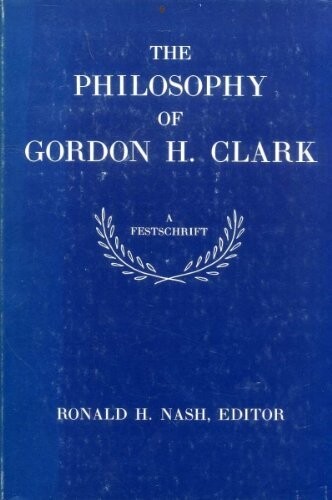The Philosophy of Gordon H. Clark
Taken from portion of GHC Review 17: The Philosophy of Gordon H. Clark By Douglas Douma / December 2, 2018 The Philosophy of Gordon H. Clark, A Festschrift, Ronald H. Nash, ed., Philadelphia: Presbyterian and Reformed, 1968, 516 pp. This book—a festschrift for Gordon H. Clark—consists of three sections. The first section is Clark’s Wheaton Lectures. The second is “exposition and criticism” from various Christian intellectuals. The third and final part consists of Clark’s replies to most of the critics. Though the book was published in Clark’s sixty-sixth year of life and he was nearing—or was expected to be nearing—the twilight of his career, approximately two-thirds of his published works were yet to come in later years. Thus the contributors to The Philosophy of Gordon H. Clark who critiqued aspects of Clark’s philosophy did not have the advantage we have today of being able to access a larger corpus of his writings. Some of them still certainly knew Clark’s thought well from his writings then published or from their personal acquaintance with him. The choice of critics is interesting in itself. None of Clark’s former students (Henry, Carnell, Lindsell, Jewett, Davis etc.) are included among the critics, though certainly some of his students were critical of his philosophy. Nor was there included any of Clark’s philosophical adversaries from the Orthodox Presbyterian Church; John Murray and Cornelius Van Til among them. The critics Nash chose to contribute to this volume were theologians no doubt, but more specifically most of them were philosophers; a category that would be stretched if those previously mentioned in this paragraph were to be included. Nash, who wrote one of the critiques in this volume, and Roger Nicole were two that found much in common with Clark; at least in their theology if not philosophy. While Van Til was not chosen, R. J. Rushdoony, Gilbert B. Weaver, C. Gregg Singer, and perhaps David H. Freeman in that order had significant affinities with his thought. The remaining contributors—Merold Westphal, Arthur F. Holmes, George I. Mavrodes, H. Harold Hartzlter, John T. Stahl, and John Warwick Montgomery—are ones that I’m not familiar enough with to accurately categorize. I’m grateful to own a copy of this book which once belonged to and is signed by Howard Long, a friend of Gordon Clark’s. Howard’s widow Genevieve, now in her nineties, graciously donated this book to me along with many others from her library. This volume is relatively rare and usually sells for over $100

